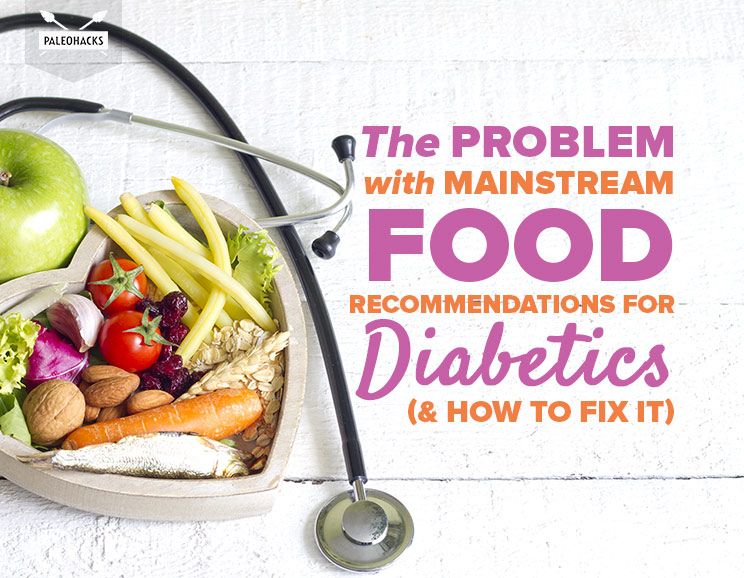Are you currently struggling with pre-diabetes or type-2 diabetes? You’re not alone. Today, one out of every two Americans either has pre-diabetes or diabetes (type-2), which puts you at greater risk of heart attack and stroke, cancer, alzheimer’s disease, kidney damage, and chronic nerve pain. (1)
Do you feel like your health isn’t improving, and you’ll be stuck on your medications for life? It’s not your fault. Unfortunately, even if you precisely follow the guidelines laid out by the American Diabetic Association (ADA), you’ll likely struggle to ever reverse your condition.
How is this struggle possible? Shouldn’t following the advice from the “experts” help you restore your health and vitality? Sadly, that’s frequently not the case. Let me explain:
Proteins, Carbs, and Fats
All the foods you eat can be lumped into three categories: proteins, carbs, and fats. Hands down, carbs have the greatest impact on your insulin and blood-sugar levels. Proteins have only a modest impact, while fats have virtually no impact at all. If you’re diabetic or pre-diabetic, the excess sugars (i.e., carbs) in your blood are at toxically high levels and making you sick.
Suffering from Diabetes or blood sugar imbalance? Grab our FREE Diabetes Guide & 7 Day Meal Plan here!
The blood-sugar hormone insulin is responsible for shuttling the food you eat (primarily carbohydrates) into your cells, which gives you energy. If you consume a high-carb or high-sugar diet (or you’re out of shape), your body is not very efficient at this process. Therefore, it must pump out more and more insulin to do the same job. If you’re pre-diabetic or diabetic, the dysfunction becomes even more pronounced. [tweet_quote] When you eat a high-carb diet, your body has a hard time converting food to energy.[/tweet_quote]
So if carbs are the greatest contributor to insulin and blood-sugar dysfunction (and thus diabetes), surely the recommendation would be to follow a low-carb diet, right? Wrong.
The ADA confirms that the single biggest factor impacting blood-sugar levels is carbohydrates, yet it doesn’t recommend a low-carb diet over a low-fat approach—despite mounting evidence. Astonishingly, their recommendations suggest that diabetics consume 40-60g of carbs per meal, plus more while snacking. What? That would amount to over 200g carbohydrates per day for diabetics. And the average intake for most Americans would be a whopping 450g per day! (2)
The problem starts when things get so bad you need medications. If you’re taking a drug to manage your blood-sugar levels, you MUST eat more carbohydrates to avoid the side effects of the medications. Ironically, you need to consume more of what’s causing your problem in the first place; that worsens your condition in the long term, and leaves you stuck on medications for the rest of your life. There is a better way.
Diabetes is a “food” disease, and lowering your carbohydrate intake is crucial. By simply reducing your carb intake, you can dramatically reduce insulin levels and improve your blood-sugar level in a matter of weeks.
Research about the effects of low-carb diets on diabetics shows dramatic improvements in blood-sugar and insulin levels, as well as key health markers (e.g., inflammation, triglycerides, and “bad” LDL cholesterol).
In 2015, the American Journal of Clinical Nutrition examined the difference between low-carb and high-carb diets in 115 obese type-II diabetics—over the course of 52 weeks. The low-carb diet beat the high-carb approach (i.e., the ADA’s recommended diet) in EVERY category: weight loss, blood-sugar control, reduction of diabetes medication, and improved cardiovascular health. (3) When you reduce your carbohydrate intake, your insulin levels improve very quickly (which is the root cause of your diabetes). [tweet_quote] Reduce your carb intake to improve insulin levels and your overall health.[/tweet_quote]
One of the biggest risk factors for heart attacks is insulin dysfunction (i.e., pre-diabetes or diabetes). People with diabetes are 42% more likely to die of a heart attack. A meta-analysis review examined the benefits of a low-carb diet on cardiovascular disease (CVD) from 20 different studies, which included over 3,000 people. A low-carb, high-fat, high-protein diet showed the greatest improvements in CVD markers; it also triggered the best blood-sugar control and weight loss, and it improved “good” HDL cholesterol.(4)
Furthermore, Harvard Medical School also had a recent finding: White breads, cereals, and processed carbs promoted significant elevations in markers of systemic inflammation in overweight individuals—which worsens every chronic disease condition.(5)
But the negative impacts of excess carb intake on insulin dysfunction and health don’t stop there. Most (if not all) individuals struggling with insulin dysfunction also have significant belly fat, which is also strongly associated with increased inflammation and damage to the lining of the gut; this increases the likelihood of intestinal permeability or leaky gut, (6) places a tremendous burden on your immune system, and can predispose you to autoimmune conditions (e.g., thyroid problems).
The solution to the problem is getting your insulin levels back on track, and the best way to do that is to adopt a low-carb diet.
Carbohydrates are NOT an essential nutrient. You need to consume foods with proteins and fats every day because your body cannot make them from its own internal machinery. Your body can make glucose (i.e., carbs) from protein and fats. In fact, you could actually eat ZERO CARBS and survive. While this tactic isn’t my recommendation, it highlights how the body requires proteins and fats for survival—but not starchy carbohydrates (e.g., breads, pastas, and potatoes).
With one out of two Americans pre-diabetic or diabetic, it’s fair to say that the overconsumption of carbs and simple sugars is rampant in today’s society.
The Problem with the Typical American Breakfast & How to Fix It
It’s not easy shaking a dependency on carbohydrates. Your hormones are geared to leave you constantly craving food, specifically carbs and simple sugars (unfortunately, not broccoli and grass-fed beef).
Tragically, we wait for disease to take root, then try to fix it. A mandate to reverse type-II diabetes is nowhere to be found in the ADA guidelines. Diabetes is a food-based disease, which requires a food-based solution. A low-carb, high-fat diet has the power to reverse your diabetes, restore your health, and get you off a lifelong dependency on medications. (And best of all, it’s absolutely delicious!)
If you want to reverse insulin dysfunction and diabetes, start with breakfast.
The typical American breakfast is ideal for promoting insulin dysfunction and diabetes; it places a dramatic emphasis on carbs, carbs, and more carbs! You don’t need cereals, juices, toast, or muesli to be sharp and energetic at work. Remove all starchy carbs and juices at breakfast (i.e., all breads, cereals, bagels, muesli, and orange juice). [tweet_quote] Ditch the cereal and start your day with eggs, avocado and berries.[/tweet_quote]
Instead, consume at least two eggs (with the yolks, which contain all 13 essential nutrients and fantastic fats). Combine it with some avocado and a handful of berries or a slice of melon. Alternatively, try plain coconut-milk yogurt with added walnuts, pumpkin seeds, and berries. Or go the smoothie route, and combine a low-carb protein powder (20-30g) with avocado, frozen berries (1/2 cup), and water.
All of these options are low-carb, high-fat, and moderate-protein. That’s the perfect combination for correcting a blood-sugar imbalance.
Once you achieve a compliance of 6 out of 7 breakfasts, shift your focus to lunch. Adopt a similar, low-carb, high-fat lunch. In other words, replace all breads, pastas, rice, and potatoes with leafy greens, veggies, and small amounts of fruit. Then once you’ve achieved a compliance rate of 6 out of 7 lunches, transform your dinner to complete the regiment.
Start Slow for Long-Term Success
You could jump in with both feet, and attack all meals every day. But in my experience, those who’ve struggled in the long term to achieve success do best by slowly integrating the changes. In terms of compliance, it’s much easier. And it’ll help you build new nutrition habits; that’s the secret to reversing your blood-sugar dysfunction or diabetes, and achieving long-term success.
The current medical system is phenomenal for acute care and emergencies. However, it woefully falls short, in terms of preventing chronic disease. Don’t wait for a disease to take root, then try to fix it. Diabetes is a food-based disease. Change your diet (i.e., reduce carbs), and you’ll quickly improve your insulin dysfunction and blood-sugar control—even if it means going against the grain.
(Note: If you currently suffer from diabetes, find a doctor in your area that supports a low-carb approach. Then you can reverse your condition.)
“Let food be thy medicine”
Hippocrates.
(Read This Next: How Too Much Sugar May Increase Your Risk of Alzheimer’s)






 4 Creative Ways to Boost Every Meal with Gut-Healing Bone Broth
4 Creative Ways to Boost Every Meal with Gut-Healing Bone Broth







Show Comments